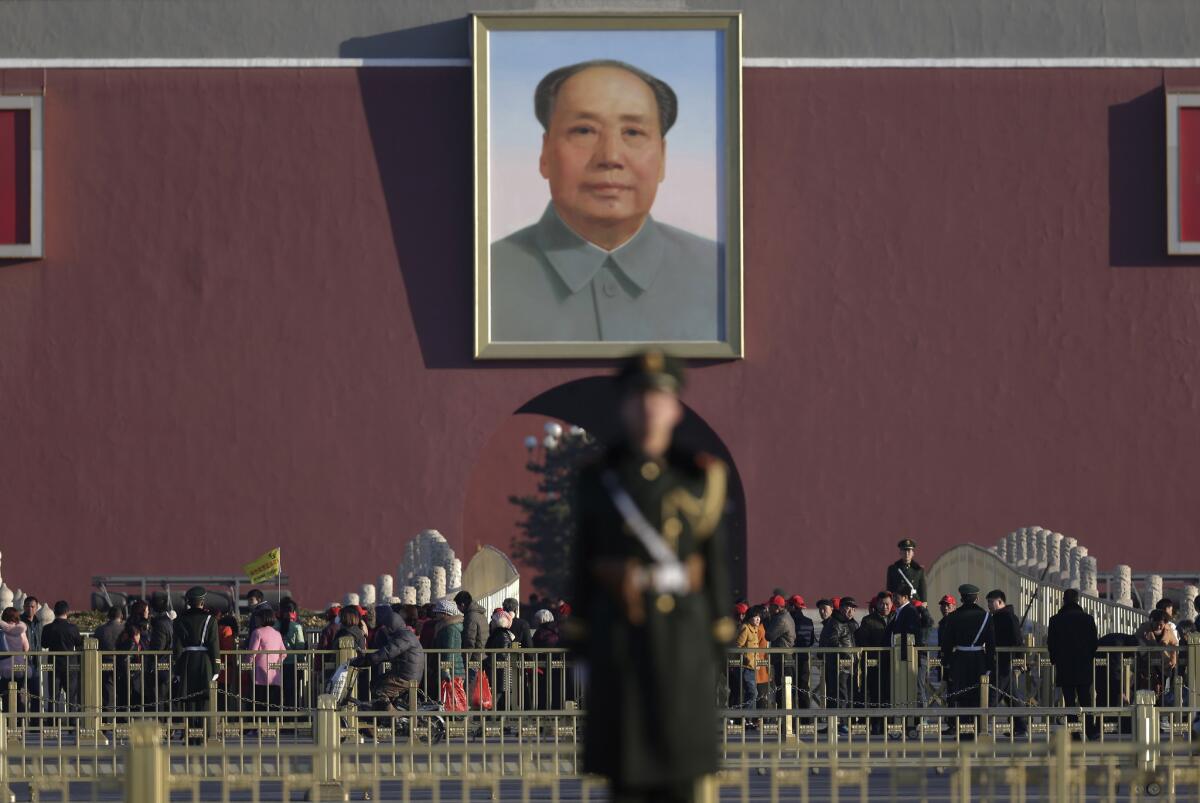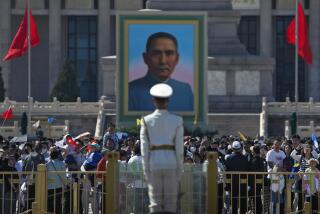China’s Dick Clark in hot water over unscripted Mao comments

Chinese paramilitary policemen stand watch over visitors in March near a portrait of Mao Tse-tung on Tiananmen Square in Beijing.
- Share via
Reporting from Beijing — You can think of Bi Fujian as China’s modern-day Dick Clark: the popular, everyman host of a weekly TV talent show and a familiar face anchoring the most-watched New Year’s program.
But after entertaining friends at a private dinner banquet with a snarky song criticizing Mao Tse-tung – a performance captured by one attendee’s cellphone camera - Bi this week found himself in a Brian Williams-sized brouhaha.
In his warbling rendition of “The Taking of Tiger Mountain,” a 1950s revolutionary opera song, the 56-year-old Bi inserted some sharp commentary, including referring to the founding father of Communist China as a “son of a bitch” and remarking that “he really hurt us bitterly.”
Bi’s fellow diners laughed, clapped and kept time with their chopsticks as he sang, but at the end of the tune, Bi asked his supper companions to keep any recordings of the gag to themselves. Yet as cellphone videos are wont to do, the 76-second clip ended up online and went viral, prompting Bi’s employer, state-run CCTV, to suspend broadcasts of his signature show, “Avenue of the Stars.”
The episode has provoked a passionate national discussion about freedom of speech, social media, privacy and trust – with some observers seeing it as an ominous return to the Mao-era culture of informing and snitching on anyone critical of the Communist Party.
“To expose the video of a private dinner destroys the basic trust in this world,” Wang Zhian, a former reporter and columnist, wrote in an online commentary Tuesday. “The importance of such trust is beyond ideology. ... Those who devalue other people’s privacy with political correctness are fascists in nature.”
The uproar over the video and its posting also highlights how nearly 40 years after Mao’s death, China is still struggling to come to grips with his legacy.
Tens of millions of Chinese died during the largely man-made famine of Mao’s 1958-61 Great Leap Forward campaign; and his 1966-76 Cultural Revolution was a lost decade during which schools were closed, educated elites persecuted, and temples, relics and other antiquities destroyed. Millions of youth – including Bi himself – had their education derailed as they were “sent down” to the countryside to do manual labor.
After Mao’s death, in a partial acknowledgement of his errors, the Communist Party famously declared him “30% wrong and 70% right.” But the party has never encouraged open discussion about - let alone a full accounting of - the 30%. Even now the darkest aspects of the Mao era receive scant attention in books, museums or other officially sanctioned forums.
At the same time, many older Chinese – particularly those who have been left behind in the country’s transition to capitalism – are nostalgic for the more equal, if poorer, days of the Communist economy.
Just who was responsible for sharing Bi’s tune with the whole of China remains unclear. Suspicion has fallen on Zhang Qing, secretary of an online education agency that offers courses run by the hard-core nationalist Kong Qingdong. Kong, who claims to be a descendant of Confucius, is a controversial academic, author, talk show host and figure of the so-called Chinese New Left, which calls for a reversal of market economic reforms and a return to Mao-style policies.
A post on Zhang’s Weibo microblog account on Monday morning that may have contained the video has been partially deleted, but that afternoon, he posted another message blasting CCTV for giving “such an important position to a person who would destroy the bowl right after he finished eating.” Zhang urged every member of the public “who loves Chairman Mao and People’s Liberation Army soldiers to strongly ask CCTV to sack Bi Fujian.”
After coming under relentless attack as the suspected snitch, Zhang said Wednesday morning that he didn’t personally know Bi and had never dined with him. At the same time, he denounced Bi for causing “great harm” to Mao and defaming the party and the army.
Zhan Jiang, a journalism professor at Beijing Foreign Studies University, said it was unclear whether the video was posted innocently, or with more sinister intentions.
“But new media is growing so fast in China, it’s clear there will be more cases like this,” he said. “Already, a lot of people – celebrities, professors, etc. – feel the pressure and are careful about expressing any controversial thoughts. Everything can be recorded, and once it hits the Internet, there are consequences.”
CCTV said that the video had “severely impacted society” and that Bi would be “seriously” investigated. Bi’s removal comes the same week that CCTV got a new president, Nie Chenxi, who is regarded as a hard-liner.
But Zhan said he believed the decision to suspend Bi was made by high-level party officials far above Nie’s grade.
It was unlikely, Zhan surmised, that Bi would return to his show. Still, he said the beloved figure known as “Grandpa Bi” was unlikely to face any harsher punishment; in recent years, some people who have aired their grievances against the government online or in other public forums have been jailed.
“I would call him lucky compared to some Internet users in China who have landed in jail for their commentaries,” said Zhan. “The worst that will probably happen to him is he’ll be sacked from CCTV.”
An online vote conducted by the Internet portal Sina showed 53.6% of respondents believed Bi did not deserve to be punished, while 30% of people said CCTV should discipline him.
Yuan Yulai, a lawyer, said he believed the person who ratted out Bi is the one authorities ought to go after.
Bi “was simply expressing himself in a private setting. He shouldn’t be the one under investigation -- the one who exposed the video should be investigated and punished,” Yuan wrote on his Weibo page. “Otherwise wouldn’t everyone feel insecure if a person is investigated for his jokes made in a private setting?”
Bi is hardly the first high-profile Chinese personality to find himself in hot water after comments he thought were going to be kept in confidence ended up online.
In January, Alibaba founder Jack Ma apologized for a tirade he delivered to friends about rival e-commerce site JD.com that ended up online. “From now on,” he said, “I will only talk in the bathhouse.”
The Shanghai Morning Post said the exposure of Bi’s critical song threatened the country’s traditional dinner culture, during which countless Chinese build social and business networks -- often over shots of liquor.
“Most people believe that meals are appropriate forums to discuss and joke. ... People can even treat dinner gatherings as a platform to complain,” the paper said. “And the participants all share the common sense that the ‘sensitive’ content will not be spread without the speaker’s permission.
“Imagine from now on, everyone at private dinners will keep a poker face and repeat the same official speech as in the office, such as, ‘Comrades and friends, let’s us have a toast to the great achievement of Communism.’ People will find it hard to adapt.”
On Thursday night, Bi took to his Weibo page to express remorse. “My personal comments have caused serious negative influence and I feel extremely remorseful and pained,” he wrote. “I sincerely apologize to the public. I will learn the lesson and restrict myself as a public figure.”
But for some people who had previously regarded Bi as little more than a play-to-the-masses celebrity, his cutting, tuneful commentary has caused them to reevaluate him in a more positive light.
“I never knew Bi Fujian was actually a free thinker with an independent personality,” wrote one commenter online. “I regret that I did not respect him in the past.”
Nicole Liu, Tommy Yang and Harvard Zhang in The Times’ Beijing bureau contributed to this report.
Follow @JulieMakLAT for news from China
More to Read
Sign up for Essential California
The most important California stories and recommendations in your inbox every morning.
You may occasionally receive promotional content from the Los Angeles Times.














